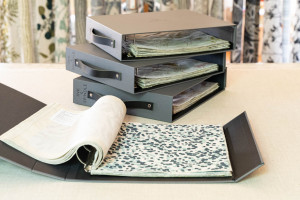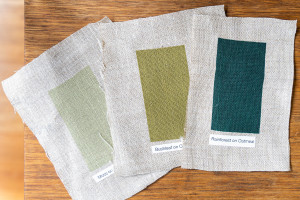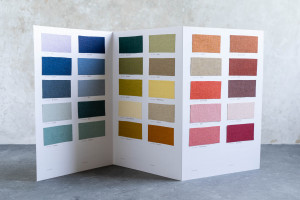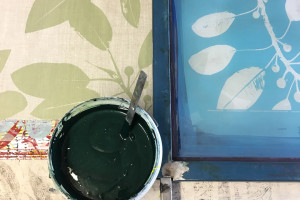FAQ
The I&S Studio
Can I visit the studio?
Yes! Our Abbotsford Convent studio has a lovely retail area which you’re welcome to visit and browse, and whilst there you might also have the opportunity to observe our print processes. You can combine your visit with lunch or coffee at one of the Convent eateries or a visit to the Collingwood Children’s Farm.
What are your opening hours?
Our studio & showroom is open Tuesday – Friday 9am – 5pm, and Saturday 10am – 2pm.
How do I find your studio?
The studio address is:
SH1.32, Sacred Heart Building
Abbotsford Convent
1 St Heliers St
Abbotsford VIC 3067
You can find our studio on the first floor via lift or stairs. Here is a handy map to guide you.
Custom printing
Do you offer wholesale/trade pricing?
Our customised and ready-made ranges are available to interior specialists at trade pricing. You can apply for trade portal access here.
Boutique manufacturers and retail stores are welcome to contact us directly for wholesale enquiries.
Can you print different colours to those shown?
To reduce wastage we do not offer custom ink colours. If there is a particular colour that is absent from our range please get in touch – we may consider adding it to the collection if we deem it suitable.
Can I supply my own basecloth?
We print on a highly curated range of organic and sustainable basecloths. We may consider a supplied basecloth if it fits our ethos and is deemed a suitable quality.
Can I supply my own design?
Unfortunately we do not print supplied designs, we only print our in-house range. We can recommend Print Ink or NMBQ for screen printing, or Next State Digital and Frankie & Swiss for digital printing.
What is the minimum length for custom printing?
The minimum length depends on the repeat of the design chosen. It varies between 2 and 2.4m.
How much is your fabric per metre?
Fabric prices vary depending on selected basecloth and number of colour separations in the design. Prices for custom printed lengths can be viewed in the customise section of our site. Select a design, choose your basecloth & colourway and the price will be updated to reflect your selection towards the bottom of the page.
What are your lead times?
Our lead time for custom printing vary from 3 – 5 weeks (plus shipping) depending on our current workload.
How can I pay?
We can accept payment via direct deposit, credit card, or PayPal. Surcharges may apply.
Do you ship worldwide?
We do indeed! We can accept orders from anywhere in the world.
What print quality should I expect?
Our fabric is hand printed and therefore subject to the variations inherent in the hand printing process. We have high print quality standards however flawless printing is never a guarantee. If the print quality is deemed by us to be substandard we will give you a discount for any wastage caused.
Samples
Can I order sample swatches?
We have three different sample options:
1) 20 x 20cm swatches that can be individually purchased from our Ready-Made store.
2) Larger 35 x 35cm swatch ring binders, featuring a cross section of our designs, suitable for showrooms:

$150 (trade only)
3) Custom printed strike-off of your chosen design in any custom colourway:
Can you supply colour samples for custom printing?
Colour swatches for custom printed colourways are available for a fee of $10 per individual colour. Samples consist of a solid colour block printed on your chosen basecloth.

Colour sampling is highly recommended for custom printing if colour accuracy is a priority. Our on screen rendering of your colourway is as accurate as technology allows, however nothing beats the real thing!
A colour swatch folder is also available for purchase, showing our full colour range:

$45ea
Our inks
Can you tell me more about your inks?
Our inks are proudly Australian made by our solar powered manufacturer, Colormaker.
From their website:
Colormaker’s PERMATONE® textile screen printing inks are Approved by the Soil Association in the UK under the Global Organic Textiles Standards (GOTS) for use in Organic Textile processes. In 2012, PERMATONE® became the first ink from outside the UK to receive such Approval. The entire family of PERMASET® textile printing inks does not contain ozone-depleting chemicals such as CFCs and HCFCs, aromatic hydrocarbons or any volatile solvents. They don’t contain lead or any heavy metals. PERMASET® inks do not contain any toxic chemicals at all, not even white spirits like other water-based inks on the market. PERMATONE® inks have also passed the Oekotex Class 1 standard (with 60% to spare) and are safe to use on underwear, swimwear and even baby clothes.
Basecloth eco-credentials
Can you tell me more about the eco-cedentials of your basecloths?
Our basecloth selection consists of environmentally sustainable or organic cloths that are also produced with ethical labour conditions in mind. Our organic cotton & hemp fibre basecloths are all GOTS certified, whereas our linens are Certified Belgian Linen and classed as “eco-linens” or Oeko-Tex Standard 100 class IV certified. More information on these standards can be found below.
What is Certified Belgian Linen?
All of our linens are Certified Belgian Linens. There is a significant difference between Belgian Linen and linens otherwise advertised as ‘French Flax Linen’, ‘European Flax Linen’ or even ‘Belgian Flax Linen’. Certified Belgian Linen is not only made using flax from the European flax growing belt, but also milled in Belgium to the highest standards. Most other types of linen go through the spinning, weaving, dyeing & washing processes in countries such as China & India. And that’s where a variety of issues with regards to quality, environment and ethics unfortunately come into play.
Our mill is one of the oldest in Belgium, has the Belgian Linen & Masters of Linen certifications and is also Carbon Neutral. It’s a long way to go to source our fabrics, but unfortunately due to Australia’s declining woven textile industry we need to source further field to ensure we’re printing our timeless designs on the best quality basecloths; ones that can be loved and lived with for a long time.
What is eco-linen and Oeko-Tex?
Linen is naturally a highly sustainable fibre, requiring no irrigation and few or zero fertilisers or pesticides. All parts of the flax plant are used with zero waste. Our Flax, Oatmeal and Natural coloured linens are classed as ‘eco-linen’, having undergone no dyeing treatments and feature the typical flax colours given to them by nature. Tests on all our linens have shown no chemical residues, making them Oeko-Tex Standard 100 class IV certified as well.
What is GOTS certification?
The Global Organic Textile Standard (GOTS) is the worldwide leading textile processing standard for organic fibres, including ecological and social criteria, backed up by independent certification of the entire textile supply chain. You can find more detailed information on the GOTS website. GOTS certification applies to our organic cotton/hemp blend fabrics and our 100% hemp fabrics. Our inks are also GOTS compliant.
Fabric care
Is the fabric washable?
Yes, the fabric has been heat set and is therefore washable. We recommend a gentle cold machine wash or hand wash. Gentle washing will preserve the life of the print.
All natural fibres will exhibit shrinkage when washed – around 5%, give or take. We recommend pre-washing if this may cause complications with your project.
Our window furnishings are dry-clean only. View our Care Instructions for more info.
Is the fabric lightfast?
The technical data sheet for our inks states the following:
“Light Fastness is good. No colours yield less than 6 on the Blue Wool Scale and most are the full 8/8. Fully heat cured prints have excellent wash and dry clean fastness.”
The above lightfastness qualities does not always extend to the basecloth used. Unbleached or coloured basecloths are subject to the same fading that you would expect from any natural fibre fabrics when exposed to direct sunlight.
What are the rub ratings on your fabrics?
Martindale rub testing results can be viewed on our basecloths page.
Our fabrics are hand printed onto natural fibres which means that although they are hard wearing they will never have the same durability as a synthetic fabric with a woven design. Heavy duty usage is only recommended if you are willing to embrace the limitations of hand printed, organic textiles (alongside their wonderful benefits!).
Will your fabrics wear over time?
With heavy repeat usage our fabrics will show some signs of wear over time. That said, we feel that they wear beautifully and have an appreciable character in keeping with the nature of hand printed fabrics.
Internships
How do I apply for an internship?
Since the pandemic we have ceased our formal intake process and instead just take interns on a case by case basis. Please email our Production Manager if you are interested in a placement.
How long is an Internship at I&S?
Our internship placements are one day a week for 4-8 weeks, ideally on a Thursday (other days possible upon request).
We’d like to give you plenty of opportunity to settle into the studio and learn the ropes, but not here so long that you get bored and are no longer learning/benefitting from the experience.
What qualifications do I need?
We are very open minded about your history and qualifications. We take students & graduates but also those who are looking for a complete career change and don’t have a background in design / textiles.
All we require is your keen-ness to learn, an interest in what we do and a good attitude! We also appreciate it when you ask questions – there’s no such thing as a stupid question.
What's an internship at I&S all about?
Interning at a small business like I&S means a couple of things: on the plus side, you get some good insight into how a small business runs. Lara, Caitlin & the team are responsible for doing almost everything in the business, and you’ll get to witness most of that. We’re also more than happy to share information, so feel free to ask us anything and we’ll answer it to the best of our knowledge.
On the downside, being small means that our production capacity is also pretty small. We don’t produce a new range of textiles every season and we don’t often get to spend time designing new prints.
We have a range of textiles & products which are highly considered and designed with sustainability and longevity in mind. When we do design new prints it usually happens in our spare time, so it’s unlikely that you’ll get a chance to witness this process – however we encourage you to ask questions and make a time for us to show you some of our processes when we have a break between other jobs.
What tasks will I be doing?
-Cutting and packaging fabric.
We often need help cutting fabrics for orders, for products (like cushions), samples or remnant bundles.
-Cutting & labelling samples
-Washing screens.
You’ll probably wash a lot of screens during your time here, and they’re big. Apologies in advance!
-Domestic duties.
Generally helping keep the studio tidy and orderly. We’ll also get you to make tea and wash the dishes. Fun times!
-Mixing inks.
If you stay for long enough we’ll show you how we mix our inks and get you to help out.
It’s also worth mentioning here that unfortunately we cannot allow interns to help us with the printing of our own textiles. Due to material costs and the nature of our processes it is not viable and a little too risky. We will gladly talk you through our processes but you will not get hands on experience with printing full width meterage.
Do internships pay?
Unfortunately no, the position is not a paid one. We try to keep our placements short to ensure that interns are getting value out of the placement for the entire time they are with us, and are not being exploited by doing the same repetitive tasks for many weeks.
We do use our internship position as a great opportunity to meet future paid staff (all our paid staff are ex interns) but there is no guarantee an internship will turn into a paid job.
